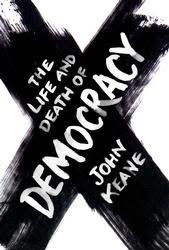 Among the most recent publications questioning the viability and sustainability of democracy as we know it is John Keane's "The Life and Death of Democracy" (Simon & Schuster, June 2009).
Among the most recent publications questioning the viability and sustainability of democracy as we know it is John Keane's "The Life and Death of Democracy" (Simon & Schuster, June 2009).From the publisher's description: "John Keane's The Life and Death of Democracy will inspire and shock its readers. Presenting the first grand history of democracy for well over a century, it poses along the way some tough and timely questions: can we really be sure that democracy had its origins in ancient Greece? How did democratic ideals and institutions come to have the shape they do today? Given all the recent fanfare about democracy promotion, why are many people now gripped by the feeling that a bad moon is rising over all the world's democracies? Do they indeed have a future? Or is perhaps democracy fated to melt away, along with our polar ice caps?"
http://books.simonandschuster.co.uk/Life-and-Death-of-Democracy/John-Keane/9780743231923
Reviews: "His contention is that the global postwar period led to a celebration of the 'victory' of western democracy that led western cultures to become complacent about the righteousness of their governance system. This, he says, has encouraged us to 'sleepwalk' into the situation that democracy now finds itself in. [...] Prof Keane is critical of what he calls the 'overuse' of democracy by the West in its foreign policy. 'There is a smell of hypocrisy around democracy,' he says." (Christopher Mackie, "The Scotsman")
"Keane's lack of theoretical rigor sometimes tells; [...] his vision of a developing monitory democracy, characterized by a hypervigilant civil society, all-seeing media and viral politics seems more faddish than focused. But his study's broad sweep, wealth of detailed knowledge, shrewd insights and fluent, lively prose make it a must-read for scholars and citizens alike." ("Publishers Weekly")
"The logic of the rule of nobody – as Keane himself encapsulates his ideal – is that nothing gets done. [...] That is why the majority of people in all countries refuse to make a fetish of democracy. More than anything else, they want governments to be effective in protecting their interests. Democracy is only one of these interests, and it is usually valued instrumentally rather than for its own sake. It is only in the seminar room, where costs and risks can be safely ignored, that the idea of rule by nobody can be taken seriously." (John Gray, Emeritus Professor, London School of Economics, in Abu Dhabi's "The National")
"Keane considers all the ways in which democracies have gone awry over the course of history. [...] A significant work, though an abridgement could help spread the word." ("Kirkus Reviews")
On 5 December 2009, Keane gave the traditional Christmas Lecture at the University of Dundee, asking "What's So Good About Democracy?". The lecture was announced thus:
"Professor Keane's entertaining, wide-ranging and controversial public lecture will argue that virtually all of the traditional arguments for democracy no longer ring true [...], 'Polls show that most people in Britain firmly believe in democracy. But when asked what they mean by democracy, and why they think it's for them, the results are full of confusions and misunderstandings.'"
Australian-born John Keane is Professor of Politics at the Centre for the Study of Democracy, University of Westminster, and a part-time Research Professor for Theory and History of Democracy at the Social Science Research Center Berlin (WZB).





No comments:
Post a Comment